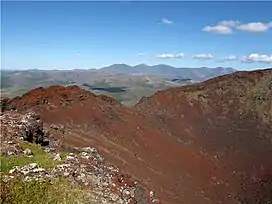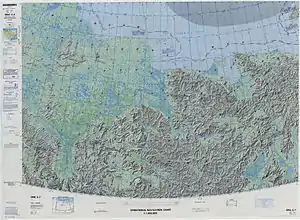Anyuy Mountains
The Anyuy Mountains (Russian: Анюйский хребет; Anyuyskiy Khrebet), also known as South Anyuy Range are a range of mountains in far north-eastern Russia. Administratively the range is part of the Chukotka Autonomous Okrug, Russia. The area of the range is largely uninhabited.
| Anyuy Range | |
|---|---|
| Анюйский хребет | |
 Landscape of the range. | |
| Highest point | |
| Peak | Blokhin Peak |
| Elevation | 1,779 m (5,837 ft)[1] |
| Coordinates | 67°11′47.7″N 165°51′28.26″E |
| Dimensions | |
| Length | 380 km (240 mi) ENE/WSW |
| Width | 80 km (50 mi) NNW/SSE |
| Geography | |
 Anyuy Range Location in Chukotka Autonomous Okrug | |
| Location | Chukotka Autonomous Okrug, Russian Far East |
| Parent range | East Siberian System |
| Geology | |
| Orogeny | Alpine orogeny |
| Age of rock | Upper Jurassic, Triassic |
| Type of rock | Sandstone, schist, mudstone and granite intrusions |
| Climbing | |
| Easiest route | from Bilibino |
Geography
To the north rises the Chuvanay Range and to the northeast the Ilirney Range, on the other side of the Maly Anyuy River.[2] The Anyuy Range is part of the East Siberian System of mountains and is one of the subranges of the Anadyr Highlands.[3] To the east of the eastern end of the range rises the Shchuchy Range, stretching in a roughly southwestern direction, and to the south of the range rises the roughly parallel Oloy Range of the Kolyma Mountains.[2]
Although there are no glaciers in the range in present times, there is evidence of ancient glaciation. The Anyuy Range is drained by rivers Maly Anyuy, Bolshoy Anyuy, and Omolon.[4] The highest point is 1,779 metres (5,837 ft) high Blokhin Peak (Пик Блохина) at 67°06′06″N 166°51′38″E,[1] and the second highest 1,759 metres (5,771 ft) high Pik Sovetskoy Gvardii (Soviet Guard Peak).[5]
In 1952 a volcano was discovered in the southern part of the range following examination of aerial images. The volcano was named Anyuyskiy.[6]
 Defense Mapping Agency topographical map showing the area of the Anyuy Range on the right. |
Flora
There are sparse forests of larch in river valleys and the mountain slopes are covered with tundra vegetation, with rocky mountain tundra on the ridges and peaks.[5]
See also
References
- Блохина, пик - National atlas of Russia
- Чуванайские горы, National atlas of Russia
- Oleg Leonidovič Kryžanovskij, A Checklist of the Ground-beetles of Russia and Adjacent Lands. p. 16 ISBN 954-642-004-2
- David M. Hopkins; John V. Matthews; Charles E. Schweger (1982). Paleoecology of Beringia. Elsevier. p. 45. ISBN 9780123558602.
- South Anyui Range // Great Soviet Encyclopedia : [in 30 vol.] / Ch. ed. A.M. Prokhorov . - 3rd ed. - M .: Soviet Encyclopedia, 1969-1978.
- Pevzner, M. M.; Gertsev, D. O.; Fedorov, P. I.; Romanenko, F. A.; Kushcheva, Yu V. (1 January 2017). "Anyui Volcano in Chukotka: Age, structure, pecularities [sic] of rocks' composition and eruptions". Lithology and Mineral Resources. 52 (1): 20–50. doi:10.1134/S0024490217010059. ISSN 0024-4902. S2CID 132021660.
External links
 Media related to Anyuy Range at Wikimedia Commons
Media related to Anyuy Range at Wikimedia Commons- In the Anyuy Volcano (На Анюйском вулкане) basov_chukotka — LiveJournal